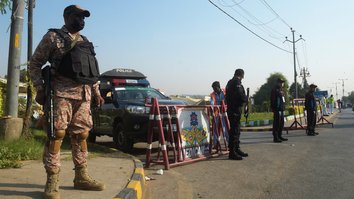QUETTA -- Tehreek-e-Taliban Pakistan (TTP) claimed responsibility for a deadly bombing at a luxury hotel hosting the Chinese ambassador in Quetta, Balochistan province, as officials raised the death toll to five on Thursday (April 22).
The bomber detonated the explosives late Wednesday while inside a vehicle in the car park of the Serena Hotel -- part of a five-star chain popular with diplomats and aid agencies -- police and the Interior Ministry said.
Police said security personnel and hotel staff were among those killed in Wednesday's blast.
The Taliban said Pakistani security personnel were the target, but many are not convinced.
![Relatives pray on the grave of a victim killed in a deadly suicide blast at a luxury hotel hosting the Chinese ambassador in Quetta on April 22. [Banaras KHAN/AFP]](/cnmi_pf/images/2021/04/22/29504-000_98h9pr-585_329.jpg)
Relatives pray on the grave of a victim killed in a deadly suicide blast at a luxury hotel hosting the Chinese ambassador in Quetta on April 22. [Banaras KHAN/AFP]
![Al-Qaeda, through its media arm al-Thabat, praised the Pakistani Taliban for its attack on the Serana Hotel in Quetta on April 21. [File]](/cnmi_pf/images/2021/04/22/29503-screen_shot-585_329.jpg)
Al-Qaeda, through its media arm al-Thabat, praised the Pakistani Taliban for its attack on the Serana Hotel in Quetta on April 21. [File]
Pakistan is fighting several low-level insurgencies in Balochistan waged by Islamist, separatist and sectarian groups, some of whom are angered by Chinese presence in the region.
The Chinese delegation was not present when the bomb detonated, said Chinese Foreign Ministry spokesman Wang Wenbin in Beijing.
Gu Wenliang, agriculture commissioner at China's embassy in Pakistan, told the Chinese newspaper Global Times that the bomb had detonated 10 minutes before their expected return.
"I was walking through the car park when I heard a sudden loud sound and the earth shook under my feet," said Khuda Baksh, a guard at the hotel.
"Everyone was running for their lives before I lost consciousness," he told AFP.
A weakened insurgency
For years the TTP unleashed deadly attacks on urban centres across Pakistan from their bases along the Afghan border, where they provided shelter to an array of global militant groups including al-Qaeda.
But a massive military offensive launched in 2014 largely destroyed the group's command and control structure, dramatically reducing insurgent violence throughout Pakistan.
"We will not allow this monster to re-emerge," tweeted Pakistani Prime Minister Imran Khan.
"We are on full alert and keeping an eye on all internal and external threats."
Al-Qaeda, through its al-Thabat media arm, praised Wednesday's Taliban attack on the hotel.
Al-Qaeda has a history of co-operating with the Taliban in Pakistan and Afghanistan.
In late March, Afghan special forces killed a senior member of al-Qaeda in the Indian Subcontinent (AQIS) together with a Taliban commander during an operation in Paktika province, proving further the ongoing ties between the two groups.
Chinese exploitation, oppression anger Pakistanis
Beijing's ill treatment of Muslims in Xinjiang has been spurring anti-China sentiment that militants are exploiting, security analysts and officials warn.
Muslim women in Chinese "re-education" camps in the Xinjiang region are systematically raped, tortured and sexually abused, former detainees and a guard revealed to the BBC earlier this year.
Meanwhile, Chinese authorities have destroyed or damaged about 16,000 mosques in Xinjiang, mostly in the past three years, according to an investigative report by the Australian Strategic Policy Institute.
In Balochistan, resentment has been fuelled by billions of dollars of Chinese money flowing into the region through the China-Pakistan Economic Corridor (CPEC) -- a key part of China's Belt and Road Initiative -- which Balochistan residents say gave them little benefit as most new jobs went to outsiders.
In 2019, gunmen stormed a luxury hotel overlooking a flagship CPEC project -- the deep-water seaport in Gwadar that gives China strategic access to the Arabian Sea -- killing at least eight people.
The seaport project particularly offends locals because of a plan to fence them off from their own port in the name of protecting Chinese workers.
Locals detest the planned fence because it would complicate the movements of the more than 300,000 residents of Gwadar district, as well as block fishing workers from their usual points of access to the sea.
And last June, Baloch insurgents targeted the Pakistan Stock Exchange, which is partly owned by Chinese companies.
The Balochistan Liberation Army claimed both attacks.

![Security personnel and volunteers arrive at the site of an explosion in the parking lot of the Serena Hotel in Quetta on April 21. Tehreek-e-Taliban Pakistan claimed responsibility for the attack, which killed at least 5 people and injured others. [Banaras KHAN/AFP]](/cnmi_pf/images/2021/04/22/29505-000_98g8w7-585_329.jpg)






Pakistan is becoming China's "B" state
Reply1 Comment(s)